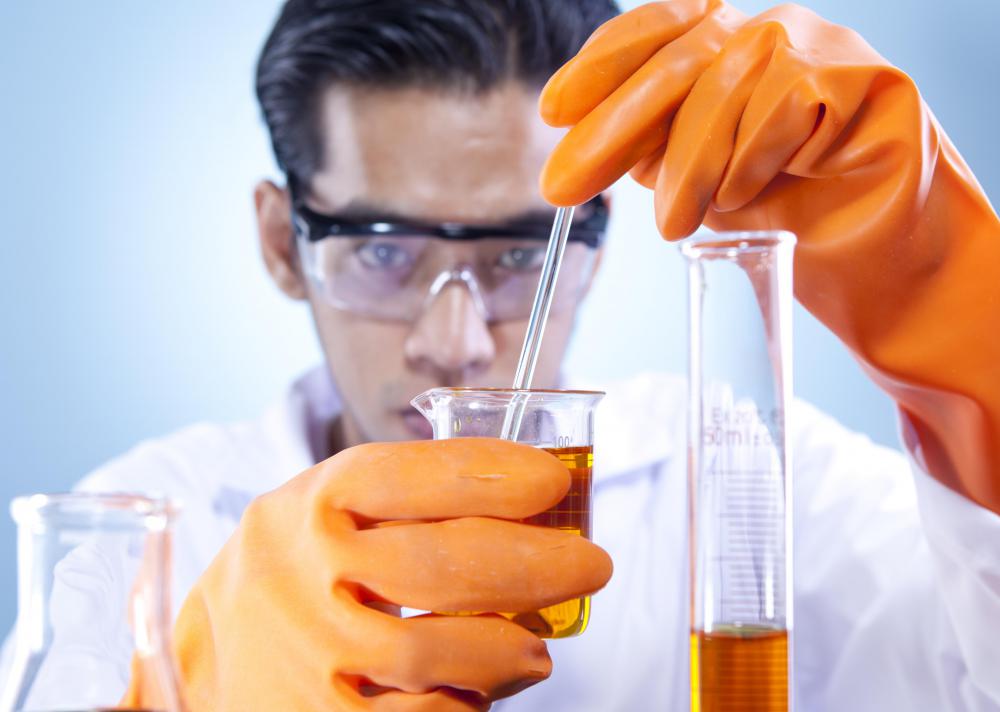At InfoBloom, we're committed to delivering accurate, trustworthy information. Our expert-authored content is rigorously fact-checked and sourced from credible authorities. Discover how we uphold the highest standards in providing you with reliable knowledge.
What is a Medicinal Chemist?
A medicinal chemist is someone who applies the principles of chemistry to the development of pharmaceutical compounds, with the goal of creating new drugs for use in medical treatment. Medicinal chemistry is a branch of chemistry which relies heavily on organic chemistry, but also involves the study of biology and medicine. Researchers in this field work on the cutting edge of drug development, working on new compounds and classes of compounds which may provide major breakthroughs in health care in the future.
Medicinal chemists work primarily with biological materials, identifying compounds of interest, learning about what they do, and figuring out how to synthesize them in the laboratory. A medicinal chemist is also concerned with the development and eventual production of drugs made from these compounds, thinking about issues like drug delivery systems, quality control of pharmaceutical compounds, and potential drug interactions which could lead to harmful complications.

New pharmaceutical compounds are being identified every day, although of the multitude discovered each year, only a handful enter more advanced stages of development. A medicinal chemist works in a lab, processing material to learn about the compounds it contains and developing techniques for synthesis of compounds which look promising. Medicinal chemists also spend a lot of time on the computer, working with modeling programs which have been specifically designed for use in medicinal chemistry so that they can study the molecular structure of the compounds they work with.
A typical medicinal chemist has at least a masters degree in chemistry, and may have pursued a doctorate as well. Careers in medicinal chemistry are a good option for people who like exploring the unknown and categorizing it, and for people with a great deal of patience and perseverance. The compounds medicinal chemists work with rarely present themselves immediately, and a medicinal chemist can spend months or years working on a single project.
Medicinal chemists are employed primarily by pharmaceutical companies engaged in drug research. They can also work for government agencies which perform drug research and analysis of organic materials of pharmaceutical interest, and they may work as educators, training the next generation of medicinal chemists and performing research in their labs. Like other people working at the cutting edge of science, a medicinal chemist usually belongs to a professional organization so that he or she can keep up with advances in the field in trade publications and at conferences with other medicinal chemists.
AS FEATURED ON:
AS FEATURED ON:











Discussion Comments
My wife majored in biochemistry but didn’t do anything further with the degree. In college she did some lab work but upon graduating did nothing more.
I think she believed that her degree would be a prerequisite for medical school. When she didn’t pursue that, she basically shelved her degree instead of looking for a chemistry job or some other vocation that would use her education.
I didn’t realize that medicinal chemistry existed as a field. I believe that this would be ideal for someone like her with a biochemistry background and an interest in the medical field.
I think it’s no small secret by now that the majority of pharmaceutical discoveries have their roots (no pun intended) in herbal medicine.
I believe that a research chemist, most of the time, is basically examining and extracting properties of different herbs and plants, and seeing which of these properties have curative powers that can be refined and turned into pharmaceutical drugs.
I think that bioorganic medicinal chemistry is where the real research takes place, in my opinion.
That’s not a blank endorsement of herbal medicine by any means. In a laboratory the chemist has access to a controlled environment. Upon dispensing the medication the drug companies conduct clinical trials to test for side effects. Herbs are just raw plants, by contrast, unrefined and untested.
I take herbal medicine, but in moderation, realizing that they are in essence drugs. I also let my doctor know what I’m taking.
Post your comments